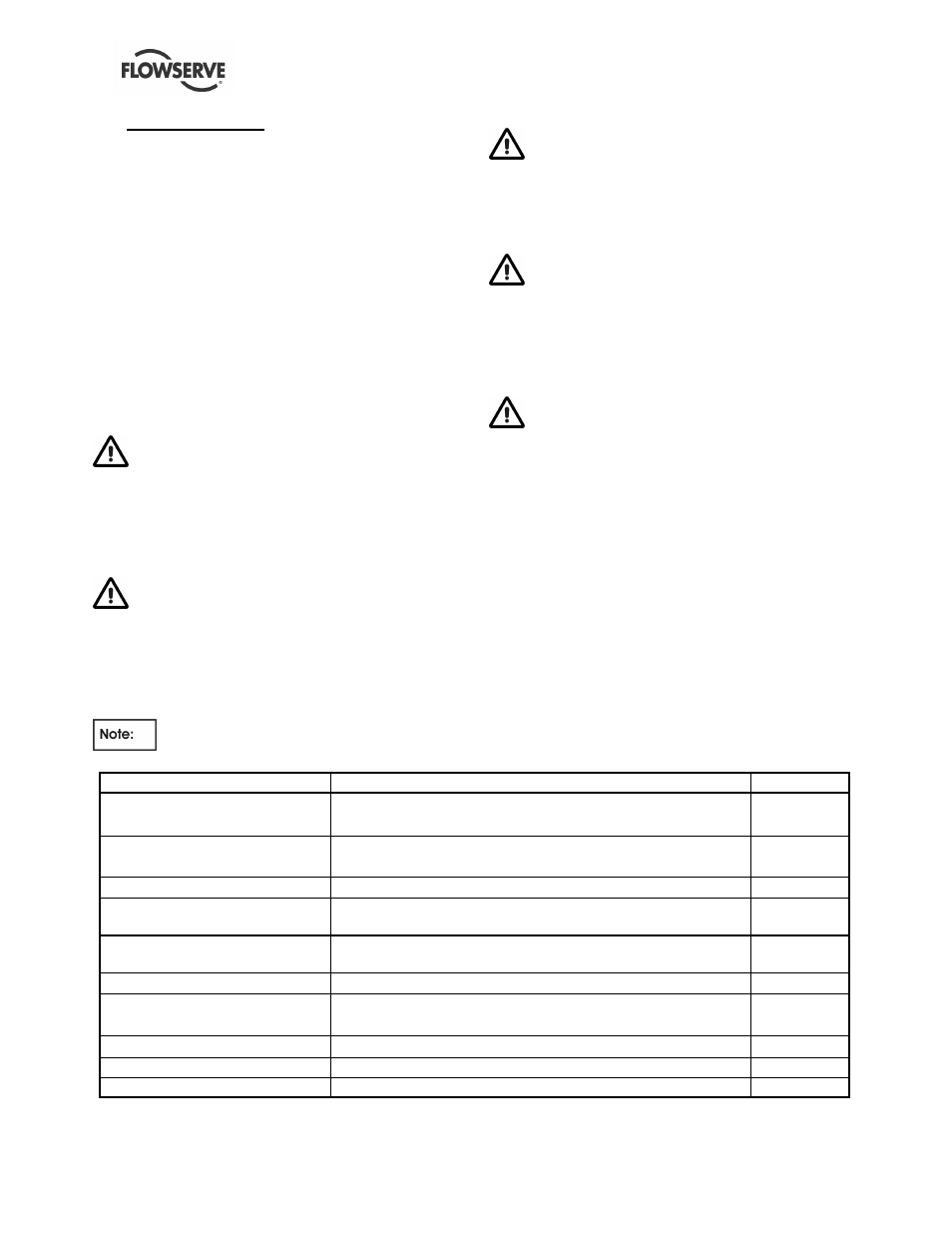Flowserve DMX User Manual
Page 34

DMX/DMXD/DMXH/DMXDH USER INSTRUCTIONS ENGLISH 85392728 - 10/09
Page 34 of 60
6
MAINTENANCE
Your pump is a precision machine. Take every
precaution to avoid damage or slight burrs to the
shaft bearing areas, as well as any other ground,
finished surface when dismantling your pump.
It should be understood that the information
contained in this manual does not relieve operating
and maintenance personnel of the responsibility of
exercising normal good judgment in operation and
care of the pump and its components.
Before performing any disassembly, maintenance
and/or inspection on the unit, the following steps
should be taken and warnings observed.
a) Tag driver controls in the "off" position.
Before attempting any inspection or repair
on the pump, the driver controls must be in the
"off" position, locked and tagged to prevent
injury to personnel performing service on the
pump.
b) Isolating Pump.
Before attempting to disassemble pump,
pump must be isolated from system, by closing
suction and discharge system valves, drained of
liquid and cooled, if pump is handling hot liquid.
c) Draining pump.
Pump cannot be fully drained.
•
If handling hot liquids
When pump is handling "hot" liquid,
extreme care must be taken to ensure safety of
personnel when attempting to drain pump. Hot
pumps must be allowed to cool before draining.
•
If handling caustic liquids
When pump is handling "caustic" liquid,
extreme care must be taken to ensure safety of
personnel when attempting to drain pump.
Protective devices of suitable protective
materials must be worn when draining pump.
•
If on vacuum service.
Before attempting any maintenance work on
pumps in vacuum service, pumps must be
isolated from suction and discharge system then
carefully vented to return pressure in pump
casing to atmospheric pressure.
6.1 Maintenance schedule
Although your Flowserve pump has been designed
for extended, trouble-free service, certain preventive
maintenance measures should be performed on a
regular basis to ensure optimum performance. A
well-planned program of routine maintenance is the
best assurance of dependable operation. The
following preventive maintenance (PM) inspections
are suggested as a minimum, and may be
supplemented by the experience of the operating
personnel.
Preventive Maintenance Item Instructions
Frequency
Suction strainer when used
Check pressure differential between the gauges located
on each side of the strainer.
Daily
Pump Suction and
Discharge Pressure/Flow Rate
Check suction and discharge pressure/flow rate for proper
pump operation.
Daily
Mechanical Seal
Inspect visually
Daily
Instrumentation
Check all related pressure gauges, temperature and
detectors, etc. to detect any abnormalities.
Daily
Shaft rotation
(Down periods only)
During extended down periods rotate the shaft by hand
1-1/4 times to prevent shaft binding.
Monthly
Auxiliary piping
Check for leakage around connections, etc.
Weekly
Shaft/bearing housing
vibration
Review all vibration data for any abnormalities
and/or sudden changes in levels.
Weekly
Bolting tightness
Check all external bolting for proper torque.
Monthly
Cleanliness
General clean-up soiled areas
Quarterly
Oil system
Refer to Lubrication System section of instruction manual.
Periodically
